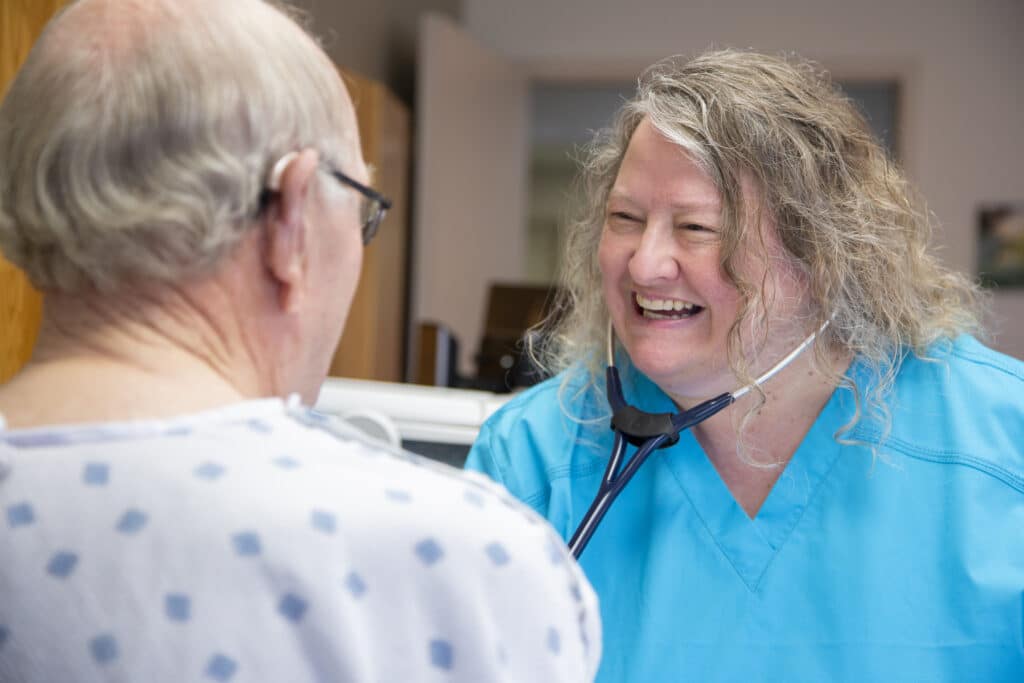As part of Respiratory Care Week 2020, let’s explore what a Respiratory Therapist is and how essential they are to healthy breathing. Respiratory Therapists work under the direction of doctors and treat a range of patients, from premature infants whose lungs are not fully developed to elderly people with lung disease. They give patients oxygen, manage ventilators and administer drugs to the lungs. Respiratory Therapists care for patients who have trouble breathing. Patients range in all ages and may suffer from a variety of health concerns. Those with asthma, emphysema, chronic respiratory disease, and heart disease, for example, all require the help of a Respiratory Therapist.

The Respiratory Therapist applies scientific knowledge and theory to practical clinical problems of respiratory care. The Respiratory Therapist is qualified to assume primary responsibility for all respiratory care modalities such as oxygen therapy, breathing treatments, humidity-aerosol therapy, pulmonary drainage procedures, mechanical ventilation, and cardiopulmonary resuscitation. RTs may be required to exercise considerable independent clinical judgment, under the supervision of a physician, in the treatment of patients with respiratory dysfunction.
Respiratory Therapists work in acute care hospitals with premature infants, pediatric/adolescent patients, adults and geriatric patients in all medical services, emergency department, neonatal/pediatric intensive care, and adult medical, cardiac and surgical intensive care units. Diverse working environments could include diagnostic pulmonary laboratory, bronchoscopy laboratory, hyperbaric oxygen (HBO) units, surgery, air and ground transport, long-term acute care units or a rehabilitation facility, or they may choose to work as a traveling Respiratory Therapist or in-home Respiratory Therapist through a home medical agency.
Overall respiratory care includes:
- Administration of oxygen
- Cardiopulmonary resuscitation
- Management of mechanical ventilators
- Administering drugs to the lungs
- Monitoring cardiopulmonary systems
- Measuring lung function
More specifically, some of the duties include:
- Examine and interview patients
- Consult with physicians to determine treatment plans
- Perform diagnostic tests such as measuring lung capacity
- Treat patients using a variety of methods such as aerosol medications and chest physiotherapy
- Obtain and analyze blood and sputum specimens
- Use ventilators to help patients breathe
- Monitor and record patients’ progress
- Teach patients how to use equipment and take medications
Respiratory Therapists work with equipment and medical supplies on a daily basis to help treat patients. For example, RTs often test lung capacity by having patients breathe into an instrument that measures volume and flow of oxygen as they breathe. Respiratory Therapists also take blood samples and use a blood gas analyzer to test oxygen and carbon dioxide levels for patients.
In some hospitals, RTs are involved in related areas such as diagnosing breathing problems, assisting patients with sleep apnea, working with cardiac and pulmonary rehabilitation patients and even offering counseling to patients on how to stop smoking.
Respiratory Therapy requires an Associate of Science degree in respiratory care. Some therapists go on to achieve a Bachelor of Science degree. All respiratory therapists must obtain a Certified Respiratory Therapist credential from the National Board of Respiratory Care. Most therapists go on to obtain the Registered Respiratory Therapist credential. All therapists must obtain a state licensure in each state they work in. Each state has different requirements. Most therapists maintain advanced life certifications such as BLS, ACLS, PALS, NRP. Some therapists obtain advanced national certifications in pulmonary function testing, sleep studies, advanced critical care for adults, or infant/pediatric specialty.
I have been a Respiratory Therapist for over 24 years now and have gained so much knowledge and work experience from all of different places I have been. If you would like to learn more about what Respiratory Care Services we offer at Windom Area Health, click here or call 507-831-0647.
Rhonda Wahl, RRT
